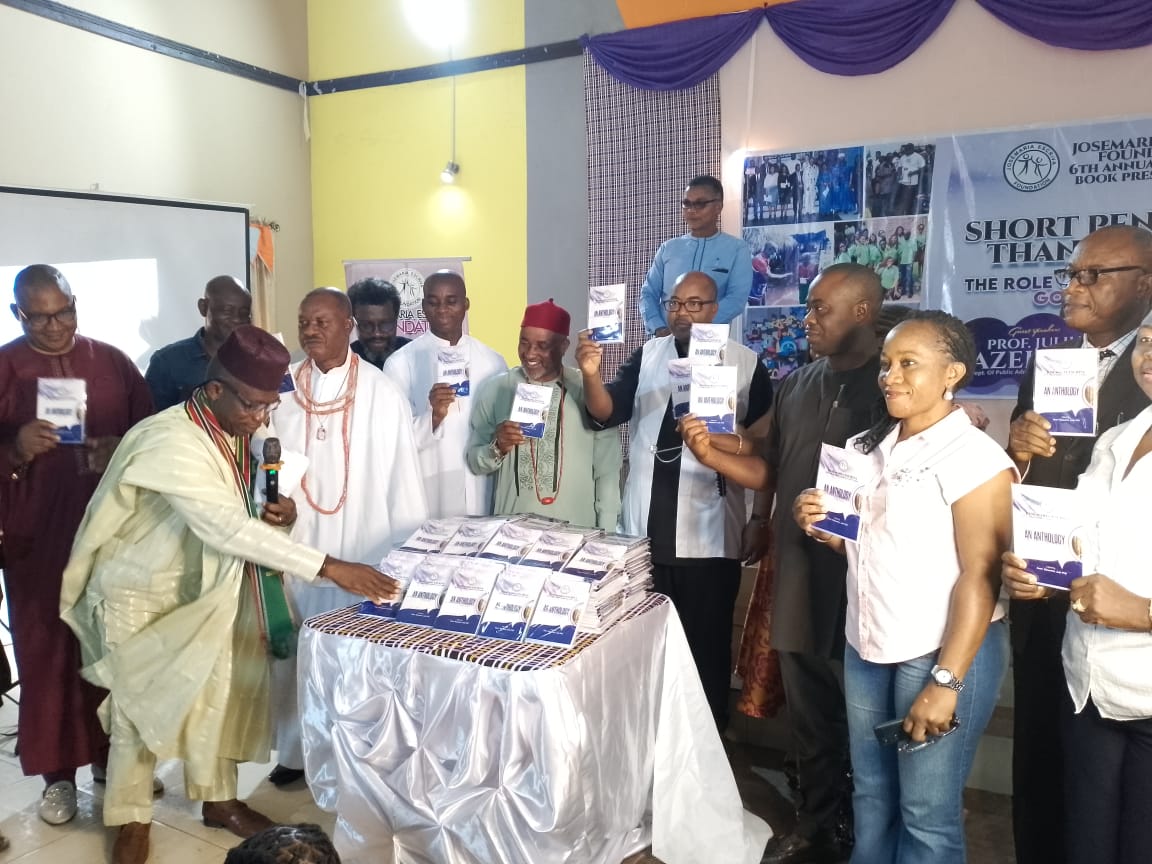By Lucky Isibor
The Chief Responsibility Officer (CRS) of Josemaria Escriva Foundation (JOSEF), Comrade Dr. Jude Obasanmi has urged organisations and individuals to cultivate the culture of proper documentation of their activities and operations in the realisation that the smallest pencil is greater than the largest form of memory.
Dr. Obasanmi made the call at the 6th annual lecture and 10th anniversary of Josemaria Escriva Foundation titled “Short Pencil is Better Than Long Memory :The role of documentation in efficient goals attainment in NGOs’ operation”, delivered by Prof. Julius Uduimho Azelema of the Department of Public Administration, Ambrose Alli University, Ekpoma
Speaking at the occasion which was also used to launch the book titled, “Josemaria Escriva Foundation Annual Lectures: An Anthology”, Obasanmi noted that documentation is the basis of meaningful engagements with state actors on the dividends of democracy, pointing out that the programme is also meant to showcase what the foundation has been doing in the last ten years.
“The programme is to mark our 10th anniversary and to showcase all that we have been doing for the past 6 years as it relates to our annual lecture. We started our annual lecture in 2019, today we had the 6th lecture in the series where we talked about short pencil is better than long memory; in other words, individuals, organisations should learn to document their processes particularly now that we’re entering a very challenging period in Edo State where politicians will make promises, we’re saying it’s high time the people began to ask questions.
“It’s high time the people began to tell them to send them their manifestos, such that when they get into office you can take that document and go and engage them; say, this is what you gave us while you were campaigning, can you do what you signed for us? But when that’s not in place and you just feel that all is stored inside your memory and you can engage them, definitely they’re going to deny. This is just to showcase what we’ve been doing over the years and to emphasis the need for people to support development work, for example we must cater for the vulnerable ones among us, we must care for those who are not able to cater for themselves and government must be seen to be doing the needful all the time; they should not allow Nigerians to cry before they begin to give out palliatives”.
Speaking to the topic “Short Pencil is Better Than Long Memory :The role of documentation in efficient goals attainment in NGOs’ operation”, the guest lecturer, Prof. Azelema noted that documentation, no matter how tangential and brief it may be, is capable of retaining information more than human being with a long memory capacity, noting that the organisational benefits may not always be in terms of Naira and Kobo, depending on the type of activities of the organisation.
While enumerating the role recording and dementation plays in the operations of organisations, Prof. Azelema stated that, “Assisting memory is one of the roles of documentation and recording in an organisation. They facilitate clarity, accountability, works, knowledge of tasks, procedures and aiding handover. They aid research, storage of information and data, knowledge of success and avoidance of rebellion. They facilitate clarity, accountability In an NGO, handing over documents and records are important parts of documentation and recording, it ensures consistency, accuracy and efficiency across the board”.
Professor Azelema also listed the indicators of low efficiency in records management to include, “Misfiling information, tasking retrieval; insufficient filing leading to messed up office layout and environment, keeping obsolete information and document, time and resources wasted in filing and retrieval; input overload, stress, burnout, high turnover among low document management”.
The erudite scholar harped on steps organisations should take to attain efficient document management to include: “Conduct comprehensive needs assessment to establish the current practices in document management in your organisation, set new goals in document management in the organisation, conduct a survey of current technologies on document management and choose the most appropriate one for your organisation, with your selected new document software, create an appropriate new SOP. You may adopt the standard of RTG (2011). That is creation, retrieval, revision and control, access and permission, disposal, sharing, etc; conduct relevant staff training on the chosen software, conduct communication and campaign on the new system”.
Earlier in his welcome remarks, the chairman of the Board of Trustees of Josemaria Escriva Foundation, Prof. Matthew Izibili thanked invited guests for gracing the occasion and for their support for JOSEF over the years, adding, “We thank all of you that have supported us thus far. While some give by serving, others serve by giving”.
In a goodwill message, a former governorship aspirant of the All Progressives Congress (APC), Engr. Gideon Ikhine appealed to the people to support the development work of Josemaria Escriva Foundation noting that “You don’t give because you have, you have because you give. You don’t have to wait to say until I have before I’ll give, you always have something to give. If you don’t sow you cannot reap. Learn to give a smile and a word of encouragement to people around you”.
Chairman on the occasion, Chief Tom Irehobhude thanked guests for their attendance and urged them to make their contribution to support the development efforts of Josemaria Escriva Foundation.
High point of the ceremony was the lunching of the book, titled, “Josemaria Escriva Foundation Annual Lectures: An Anthology”, by the Chairman on the occasion, Chief Tom Irehobhude, Engr. Gideon Ikhine, the Chief Responsibility Officer of Josemaria Escriva Foundation, Dr. Jude Obasanmi and others; and the cutting of the 10th anniversary cake.
